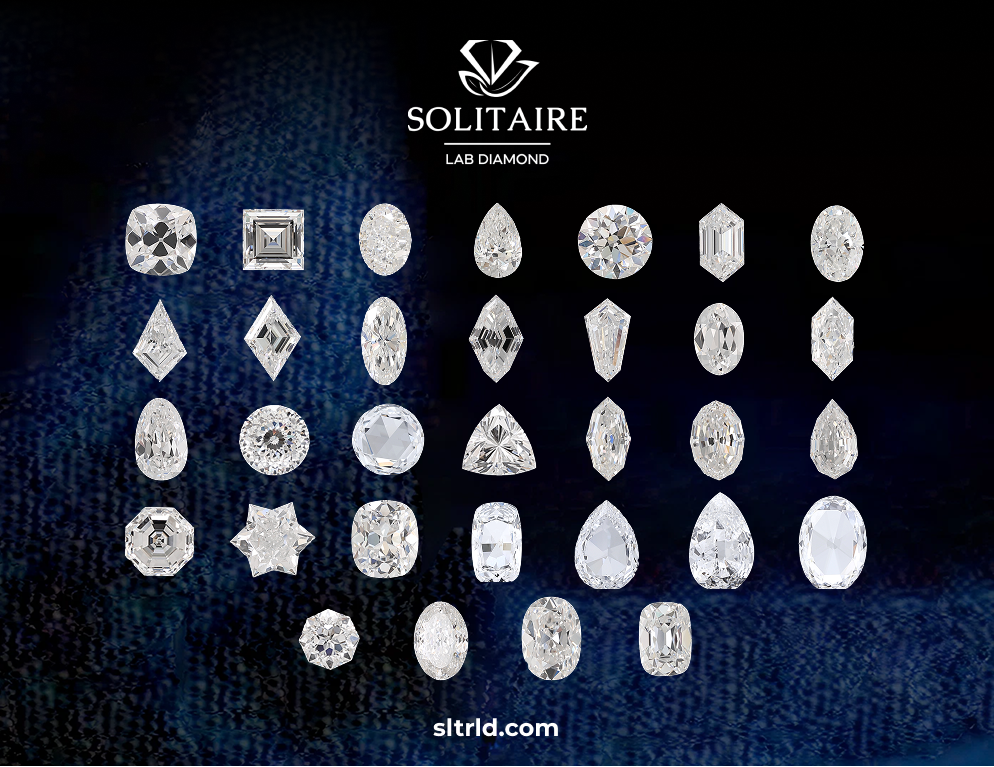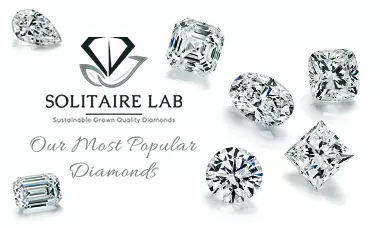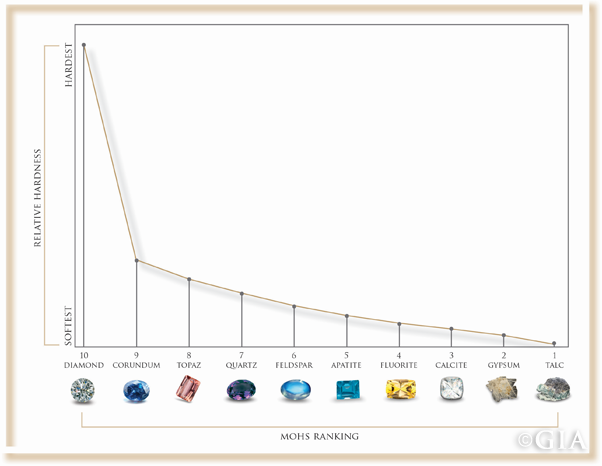While most people focus on the 4Cs, that is, cut, color, clarity, and carat weight, another quality quietly shapes how well a diamond will perform over time: that is, hardness. This single property affects how resistant the stone is to scratches, how well it maintains its polish, and how effortlessly it holds its brilliance through years of daily wear.
In gemology, hardness simply refers to a stone’s ability to resist scratching, which becomes especially important for jewelry that faces constant contact with surfaces, dust, and other materials.
A diamond’s remarkable hardness is one of the reasons it remains the preferred choice for engagement rings and fine jewelry meant to last a lifetime. It helps the stone keep its shine, protects its surface, and ensures it ages gracefully even with regular use.
In this blog, we take a closer look at what diamond hardness really means and why it plays such an important role when choosing a diamond.
What is Diamond Hardness?
In gemology, hardness refers to how well a mineral can resist scratching. When experts talk about a gem’s hardness, they are describing its ability to avoid surface marks or abrasions. A harder material can scratch a softer one, but a softer material cannot scratch something harder.
It is important to understand that hardness is not the same as toughness or strength. Hardness tells us how scratch-resistant a diamond is, while toughness refers to how well it can resist chipping or breaking.
So even though diamonds are the hardest natural material on earth, they can still crack if they are hit at the right angle with enough force.
Why Diamonds Are the Hardest Natural Material?
Diamonds get their exceptional hardness from their atomic structure. Each carbon atom is tightly bonded to four other carbon atoms in a strong, three-dimensional lattice. These strong carbon-to-carbon bonds are what make diamonds extremely resistant to scratching.
How to Measure the Hardness of a Diamond?
To measure the hardness of a diamond, gemologists use a system called the Mohs Scale. This scale checks whether one mineral can scratch another. If a mineral can scratch something else, it means it is harder. When testing a diamond, experts try scratching it with different minerals. Since none of them can scratch the diamond, and the diamond can scratch all of them, it earns the highest score of 10 on the Mohs Scale.
It’s also important to know that the Mohs Scale measures only how well a diamond resists scratches, not how easily it might chip or break. While modern labs have more advanced tools for precise testing, the Mohs Scale remains the simplest and most widely used method for judging a diamond’s hardness.
Diamond’s Hardness on the Mohs Scale
The Mohs Scale is the standard way to measure mineral hardness. It ranks materials from 1 (the softest) to 10 (the hardest). Here is a simple comparison of common minerals based on their hardness.
Source: Gem and Mineral Hardness
|
Mineral |
Mohs Hardness Rating |
Degree Of Hardness |
|
Talc |
1 |
Very Soft |
|
Gypsum |
2 |
Soft |
|
Calcite |
3 |
Soft to Medium |
|
Fluorite |
4 |
Medium |
|
Apatite |
5 |
Medium |
|
Orthoclase Feldspar |
6 |
Moderately Hard |
|
Quartz |
7 |
Hard |
|
Topaz |
8 |
Very Hard |
|
Corundum |
9 |
Extremely Hard |
|
Diamond |
10 |
Hardest Known Material |
This means a diamond can scratch most other materials, but only something as hard as another diamond can scratch it.
Why Hardness Matters for Diamonds?
Hardness plays a big role in how well a diamond performs over time. It is the reason diamonds remain the top choice for engagement rings and everyday jewelry. Here’s why hardness matters so much when choosing a diamond.
- A diamond keeps its sparkle for years because its hard surface doesn’t scratch easily, while softer gemstones lose polish from everyday wear.
- It’s perfect for daily jewelry since it can handle bumps and contact with surfaces like countertops, door handles, and keyboards without showing wear.
- Its hardness protects it from surface marks, so the sharp facet edges that create brilliance stay crisp much longer than in softer stones.
- Diamonds hold their beauty for generations, which is why they are linked with long-lasting love and give buyers confidence in their investment.
Are Lab-Grown Diamonds as Hard as Real Diamonds?
Yes, lab-grown diamonds are just as hard as natural diamonds. They are made of the same pure carbon, arranged in the same crystal structure, which is what determines hardness. Because of this identical structure, both types of diamonds receive a perfect score of 10 on the Mohs Scale.
Whether a diamond forms deep in the Earth over millions of years or grows in a lab over weeks, the atomic arrangement that creates hardness is the same. Lab-grown diamonds are tested the same way as natural diamonds, and major grading labs like IGI and GIA confirm that they match natural diamonds in hardness.
Some people believe lab-grown diamonds are “weaker” or “softer,” but this is a misconception. The only real differences are their origin, environmental impact, and price.
Learn more: Lab Grown vs Natural Diamonds: Comparison of Price, Quality, and Style
What Is the Best Hardness for Rings?
For everyday rings, gemologists suggest choosing gemstones that are at least 8 on the Mohs Scale. This level of hardness helps protect the stone from scratches that can happen during normal daily activities. Even dust can contain quartz, which has a hardness of 7, and can slowly scratch softer stones over time.
Diamonds, with a hardness of 10, are the best option for engagement rings and other daily-wear jewelry. They stay beautiful for decades with very little maintenance, which is why they are the top choice for long-lasting rings.
Other gemstones vary in hardness:
- Sapphire & Ruby (9): Very durable and great for everyday wear.
- Moissanite (9.25): Extremely hard and close to diamond in performance.
- Emerald (7.5–8): Can be worn daily but needs more care due to its lower hardness.
- Opal, Pearl, Moonstone (below 7): Too soft for everyday engagement rings and can be scratched easily.
The hardness of your chosen gemstone directly impacts lifespan, maintenance requirements, and resistance to everyday friction. For engagement rings where daily wear is expected for decades, the diamond's exceptional hardness makes it the logical choice.
Explore our collection: Lab Grown Diamond Collection by Shape
Do Diamonds Scratch Easily?
No, diamonds do not scratch easily. Only another diamond is hard enough to scratch a diamond, so normal daily activities won’t leave scratch marks on your stone. Things like dust, metal, glass, or countertops are all too soft to damage a diamond’s surface.
However, diamonds can get scratched if they rub against other diamonds. This can happen if you store diamond jewelry together, wear two diamond rings next to each other, or let loose stones touch in a jewelry box.
It is important to understand that scratching and chipping are two different things. A diamond won’t scratch easily, but it can chip if it is struck hard around the edges or corners. A sudden bump against a hard surface or a loose setting can increase this risk.
To protect your diamond, store each piece separately, avoid diamond-to-diamond contact, check the setting regularly, and remove your ring during tasks where your hand might hit hard surfaces, such as lifting heavy objects, opening tight lids, or using tools.
Summing It Up
Diamond hardness is the key reason diamonds are the top choice for engagement rings, wedding bands, and jewelry worn every day. Their extreme hardness means they stay shiny, resist scratches, need very little maintenance, and keep their beauty for many years.
Lab-grown diamonds offer the same hardness as natural diamonds. Both score a perfect 10 on the Mohs Scale, so their durability is identical. This means your choice between natural and lab-grown should depend on budget, style, or environmental preference and not strength or quality.
Solitaire Lab Diamond provides certified lab-grown diamonds that match natural diamonds in hardness, brilliance, and durability, while offering more affordable pricing. Our wide selection and strict certification standards ensure you get high-quality stones your customers can trust.
Explore certified lab-grown diamonds that offer the same hardness, brilliance, and durability as natural diamonds. Contact our team for wholesale pricing and inventory access, or browse our complete diamond collection to discover the perfect stones for your next jewelry piece.




